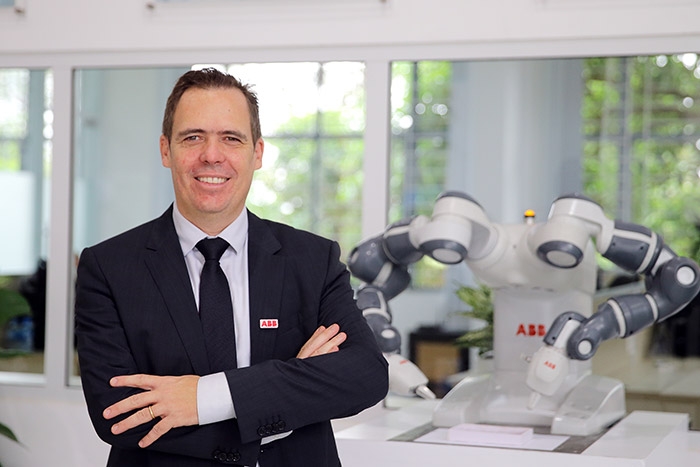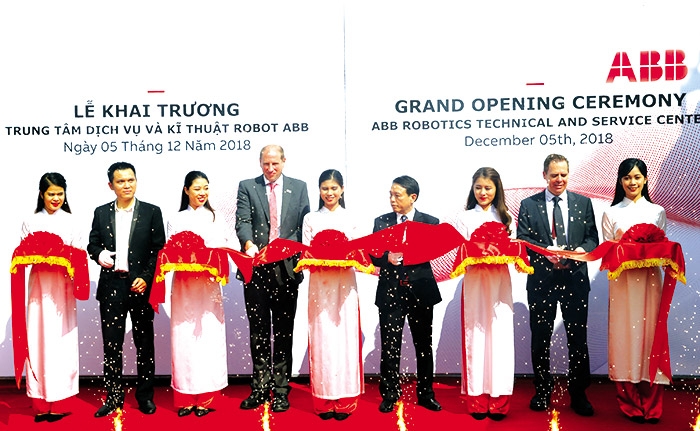ABB opens Vietnam’s first Robotics Technical and Service Centre
 |
| Arno Strotgen, vice president of ABB’s customer service, business unit robotics |
Vietnam is putting the spotlight on catching up to and taking the lead in Industry 4.0. What role does Vietnam play in ABB’s strategy and what unique offerings can you bring to this market?
First of all, I want to say that we at ABB’s Robotics Business Unit appreciate Vietnam’s strong growth and think that the country will become an important regional and maybe even global manufacturing hub. As the leading robotics company in Vietnam, we have quite a solid base here, along with very important global and local customers.
With a fast growing economy and young population, Vietnam is shifting to a global manufacturing base. Although the need for robots is estimated to reach a million in 2020, most local industrial production firms are still lagging behind, and still untouched by Industry 4.0
ABB Robotics has been a pioneer in connectivity. Now everybody talks about 4.0, but we actually began working on it 10 years ago by connecting robots via GPRS with our cloud.
This technical centre will not only help our local team, but allow us to co-operate with customers to develop Industry 4.0 with our connected services, which transfer information from robots around the world to our ABB Ability.
This centre will bring the manufacturing industry – and even universities – closer to companies like ABB to show them the incredible gains new technology could yield.
This will also ensure faster reaction time, higher efficiency and better service technician preparation for on-site calls and support, ultimately helping to keep robot systems running at optimal performance.
What we bring to Vietnam is know-how. We strive to be local, but at the same time bring a great store of application knowledge we have amassed from over 400,000 robots installed globally.
This ensures the versatility of our robots, enabling them to be used for a spectacular range of tasks in a myriad of industries: packaging, painting, assembly – even complex activities like welding. This know-how we bring from our global centres to Vietnam to support our wide range of connectivity solutions.
 |
What are your target customer segments in Vietnam?
In globally, these are interesting times for the robotics industry. We are seeing double-digit growth due to everincreasing flexibility, easy-to-use interfaces and more powerful and less expensive sensors, such as vision and force control, that allow robots to become more human-like.
Additionally, the collaboration between robots and humans is signifying a new era in robotics. All these changes are bringing robots into new segments, such as entertainment, food and beverages and electronics.
We are strong globally and in Vietnam, which allows us to look at a wide range of segments. We are very strong in the electronics industry and have contracts with large-scale manufacturers who produce mobile phones, TVs, and other electrical appliances, with robots not only doing the heavy lifting, but also precision tasks far faster and with far more accuracy than human hands could.
In the automotive industry, we are actually participating in Vietnam’s very first electric vehicle manufacturing facilities by VinFast. We have around 1,200 robots deployed in car bodyshop which is highly-automated factory and runs on the latest technology.
Then we have food and beverages, where there are also great opportunities for robotics for packaging and palletising the product packages when it comes out of the line. Additionally, we see great potential for digitalisation in logistics.
Last but not least, the metal fabrication related segment such as motorbike, furniture, supporting industries are also our target customer segments in which we works mainly with our local system integration partners to deliver differentiated values to our end-customers.
ABB’s Robotics Technical and Service Centre is the first of its kind in the country and aims to serve global and local manufacturers operating in the northern region. Do you have any plans for southern Vietnam?
This is the first centre where we combine our products of different applications and capabilities of training highly qualified engineers, while also having the spare parts to be able to serve customers with high-quality, customised solutions. We are going to open a centre in Ho Chi Minh in the coming year. We always aim to be very close to our customers.
Everywhere we go, we make sure we have extensive local presence and local know-how to support our services because it is not only about being first to invest in a given area – we install a base of operations that will last well into the next decade and can make the best use of our current and future equipment.
A qualified workforce is essential to reduce production costs and exploit the full potential of modern robotics technology. How will ABB contribute to the development of the next engineering generations in Vietnam through this centre?
I think when we talk about Industry 4.0, digitalisation, robotics, and all the new manufacturing technologies, a big part of this whole transformation is how we get the workforce trained in these new technologies.
We work closely with engineering universities in many countries, and in Vietnam particularly through its 25 year presence in the country. In robotics aspect particularly, it includes exchanging information or even putting robots at their sides where they can be used for various purposes.
We also sponsor engineering universities and vocational schools the 3D Simulation Software – RobotStudioTM to help students virtually program and simulate the robot systems for many different applications.
This is also part of what we at ABB try to make happen with this centre: we can work together with companies but also with universities. The names of several universities have already come up to establish a working relationship with, to acquaint students with the newest technologies coming out to the market.
For instance, the Technology University of Hanoi National University has already bought two of our YuMi collaborative robots for education and training purposes – I hope we will see many similar partnerships in the future.
What the stars mean:
★ Poor ★ ★ Promising ★★★ Good ★★★★ Very good ★★★★★ Exceptional
Related Contents
Latest News
More News
- The next leap in Cloud AI (December 11, 2025 | 18:19)
- Vietnam’s telecom industry: the next stage of growth (December 11, 2025 | 18:18)
- Five tech predictions for 2026 and beyond: new era of AI (December 11, 2025 | 18:16)
- CONINCO announces new chairman and CEO (December 10, 2025 | 11:00)
- How AWS is powering the next-gen data era (December 09, 2025 | 13:14)
- Outlook in M&A solid for Singapore (December 08, 2025 | 10:31)
- Vietnamese firms are resetting their strategy for global markets (December 05, 2025 | 17:04)
- LPBank Securities accelerates AI and data innovation with AWS (December 05, 2025 | 09:00)
- Improving traceability capacity with Zebra Technologies (November 26, 2025 | 10:08)
- Ho Chi Minh City engages 500 CEOs in dialogue on building global megacity (November 25, 2025 | 16:00)

 Tag:
Tag:




















 Mobile Version
Mobile Version